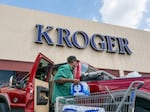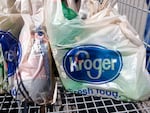
A shopper loads his truck at a Kroger grocery store in Houston on Sept. 9, 2022.
Brandon Bell / Getty Images
A federal judge in Portland heard closing arguments Tuesday over the proposed merger between supermarket giants, Kroger and Albertsons.
Kroger’s $25 billion dollar plan to acquire Albertsons would create a $200 billion company with about 5,000 stores in 48 states. It would be the biggest supermarket merger in U.S. history.
Company lawyers told the court that the size of the resulting company would allow it to bolster leverage with suppliers and, hence, reduce prices. They also said Kroger would be better able to compete against retailers like Costco, Walmart and Amazon, which are increasingly selling groceries.
The three-week trial over an injunction in the case has drawn national attention, in part because of the merger’s size, but also because of heightened consumer — and voter — concern about inflation and the cost of groceries.
High food prices have become an issue in the presidential race, with Vice President Kamala Harris backing a federal ban on price-gouging in the food and grocery industries. Former President Donald Trump has pledged to end the “inflation nightmare” even as economists have warned some of his policy proposals could drive up the cost of imports. The current administration has been pushing to reduce consolidation in several important sectors including pharmaceutical companies, airlines, publishing and technology.
The Federal Trade Commission has come out against Kroger and Albertsons forming one company. Their attorneys told the court Tuesday that the merger would reduce competition, hurt the pay and benefits of workers and give Kroger more leverage to raise prices.

Kroger first announced its plans to buy Albertsons in October 2022.
Rogelio V. Solis / AP
In one respect the case revolves around the definition of a supermarket. Is it just a store that sells groceries, or are much larger retailers like Costco also supermarkets, when they sell televisions, canoes and earrings as well?
The FTC is trying to convince US District Judge Adrienne Nelson to draw a circle around ‘traditional food-only supermarkets’ when gauging the harm to competition.
Judge Nelson had no questions for lawyers Tuesday but said she’d work hard to reach a decision soon.
In bringing the case, the FTC has been joined by eight states, including Oregon, California and Illinois, as well as the District of Columbia. Lawsuits have also been filed by state attorneys general in Washington and Colorado. Those states are expected to pay a lot of attention to what happens in the federal district court in Oregon.
